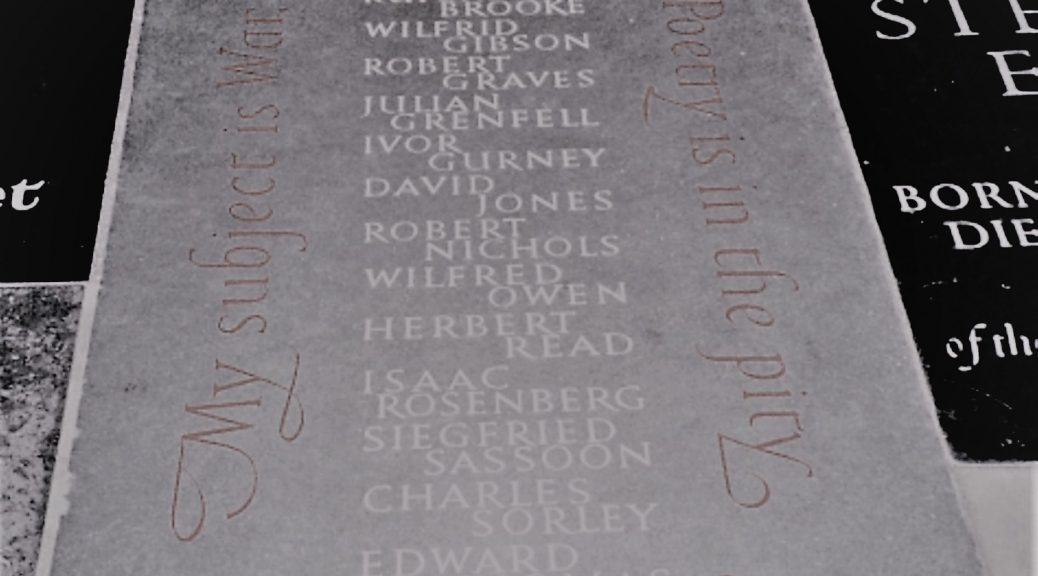The title of this inaugural issue, The Fallen & the Unfallen, is drawn, by way of homage, from Geoffrey Hill’s first collection of poems, For The Unfallen (1959). The cover illustration is a photograph of the memorial stone for poets of World War I found in Poets’ Corner at Westminster Abbey (unveiled November 11, 1985). The list of names is framed by a quotation from Wilfred Owen, “My subject is War, and the pity of War. The Poetry is in the pity.”
Some of the papers presented in this issue result from workshops held at the University of Caen that examined poetry from First World War poets, and works inspired by them. While the shift from the poetry of World War I to poetry about the Vietnam War may seem a bit abrupt, in fact it was soldiers’ shell shock that motivated many of Freud’s studies, leading to his theories about trauma during and immediately following World War I. Trauma theories have played a significant role in our perception of the Vietnam War. Furthermore, it was during the Vietnam War period that war poetry from World War I came into general public appreciation. Jon Silkin fostered a renewed appreciation of World War I Poetry in Britain, with an influence extending to other English speaking countries, by way of his periodical Stand, which in 2012 celebrated its 60th anniversary.
I would like to thank Rosanna Warren for the candor of her interview, Jon Glover, Stephen Romer and Jeffrey Wainwright for their poetry, and the contributors who have submitted state-of-the-art articles and generously offered reviews for this inaugural issue. My heartfelt thanks is also due to Michael Taugis who provided assistance and editorial footwork.
It is particularly moving for me that the inaugural issue presents work by Thomas Christopher D’Arcy and Dominic Hibberd. The former has written about war poetry and has had the personal experience of being a soldier. The latter regrettably passed away this past August. Dominic Hibberd was a groundbreaking scholar who ensured that Wilfred Owen and Harold Monro would be of interest to future generations. He was also endowed with a pleasant spirit. It was my privilege to show him a small part of Caen and its University when he attended a workshop there in 2005.
Edited by Jennifer Kilgore-Caradec, March 2013.
Dominic Hibberd
A note on the origins of 1914-1918 ‘‘war poetry’’
Gilles Couderc
The War Requiem: Britten’s Wilfred Owen opera
Marie-Noelle Provost Vallet
Ghosts in Craiglockhart: Sassoon’s textual presence in Pat Barker’s Regeneration
Jennifer Kilgore-Caradec
Resisting the Rhetoric: Memory in the Poetry of Ivor Gurney
Roland Bouyssou
In Parenthesis: A War Liturgy
Thomas Christopher D’Arcy
War Trauma, Recovery Narration, and the Need for Resistance: The Case of D. F. Brown’s Vietnam War Poetry
Jon Glover
Truth, Introspection and Extrospection
ENCYCLOPEDIA
Jean-Michel Panoff
The Biological Targets of Chemical Weapons
REVIEWS
Antoine Capet reviews “The Vorticists: Manifesto for a Modern World” (Tate Britain, 2011)
Monique Lojkine Morelec reviews Antoine Choplin, Le héron de Guernica (2011)
Beatrice Pire reviews Jonathan Franzen, Freedom: A Novel (2010)
Carole Birkan-Berz reviews Geoffrey Hill, Clavics (2011)
INTERVIEW
And about the Mud… Rosanna Warren
NEW WORKS
